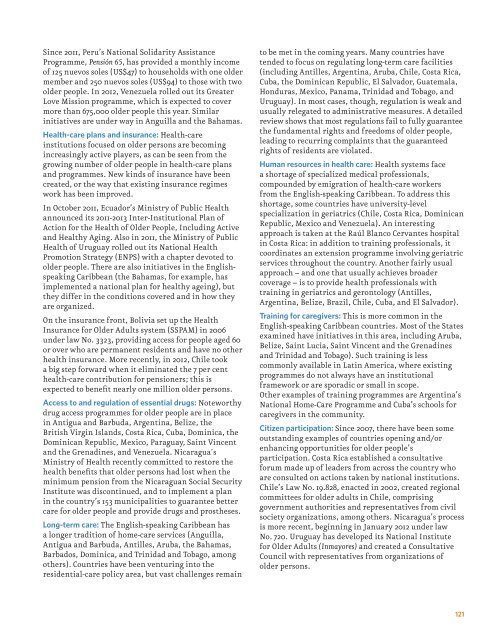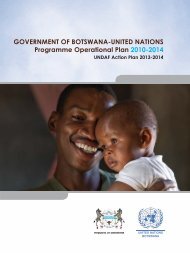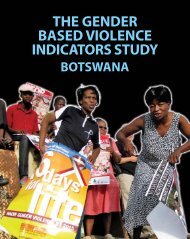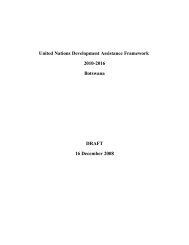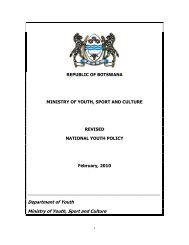Ageing in the Twenty-First Century: - HelpAge International
Ageing in the Twenty-First Century: - HelpAge International
Ageing in the Twenty-First Century: - HelpAge International
Create successful ePaper yourself
Turn your PDF publications into a flip-book with our unique Google optimized e-Paper software.
S<strong>in</strong>ce 2011, Peru’s National Solidarity Assistance<br />
Programme, Pensión 65, has provided a monthly <strong>in</strong>come<br />
of 125 nuevos soles (US$47) to households with one older<br />
member and 250 nuevos soles (US$94) to those with two<br />
older people. In 2012, Venezuela rolled out its Greater<br />
Love Mission programme, which is expected to cover<br />
more than 675,000 older people this year. Similar<br />
<strong>in</strong>itiatives are under way <strong>in</strong> Anguilla and <strong>the</strong> Bahamas.<br />
Health-care plans and <strong>in</strong>surance: Health-care<br />
<strong>in</strong>stitutions focused on older persons are becom<strong>in</strong>g<br />
<strong>in</strong>creas<strong>in</strong>gly active players, as can be seen from <strong>the</strong><br />
grow<strong>in</strong>g number of older people <strong>in</strong> health-care plans<br />
and programmes. New k<strong>in</strong>ds of <strong>in</strong>surance have been<br />
created, or <strong>the</strong> way that exist<strong>in</strong>g <strong>in</strong>surance regimes<br />
work has been improved.<br />
In October 2011, Ecuador’s M<strong>in</strong>istry of Public Health<br />
announced its 2011-2013 Inter-Institutional Plan of<br />
Action for <strong>the</strong> Health of Older People, Includ<strong>in</strong>g Active<br />
and Healthy Ag<strong>in</strong>g. Also <strong>in</strong> 2011, <strong>the</strong> M<strong>in</strong>istry of Public<br />
Health of Uruguay rolled out its National Health<br />
Promotion Strategy (ENPS) with a chapter devoted to<br />
older people. There are also <strong>in</strong>itiatives <strong>in</strong> <strong>the</strong> Englishspeak<strong>in</strong>g<br />
Caribbean (<strong>the</strong> Bahamas, for example, has<br />
implemented a national plan for healthy age<strong>in</strong>g), but<br />
<strong>the</strong>y differ <strong>in</strong> <strong>the</strong> conditions covered and <strong>in</strong> how <strong>the</strong>y<br />
are organized.<br />
On <strong>the</strong> <strong>in</strong>surance front, Bolivia set up <strong>the</strong> Health<br />
Insurance for Older Adults system (SSPAM) <strong>in</strong> 2006<br />
under law No. 3323, provid<strong>in</strong>g access for people aged 60<br />
or over who are permanent residents and have no o<strong>the</strong>r<br />
health <strong>in</strong>surance. More recently, <strong>in</strong> 2012, Chile took<br />
a big step forward when it elim<strong>in</strong>ated <strong>the</strong> 7 per cent<br />
health-care contribution for pensioners; this is<br />
expected to benefit nearly one million older persons.<br />
Access to and regulation of essential drugs: Noteworthy<br />
drug access programmes for older people are <strong>in</strong> place<br />
<strong>in</strong> Antigua and Barbuda, Argent<strong>in</strong>a, Belize, <strong>the</strong><br />
British Virg<strong>in</strong> Islands, Costa Rica, Cuba, Dom<strong>in</strong>ica, <strong>the</strong><br />
Dom<strong>in</strong>ican Republic, Mexico, Paraguay, Sa<strong>in</strong>t V<strong>in</strong>cent<br />
and <strong>the</strong> Grenad<strong>in</strong>es, and Venezuela. Nicaragua´s<br />
M<strong>in</strong>istry of Health recently committed to restore <strong>the</strong><br />
health benefits that older persons had lost when <strong>the</strong><br />
m<strong>in</strong>imum pension from <strong>the</strong> Nicaraguan Social Security<br />
Institute was discont<strong>in</strong>ued, and to implement a plan<br />
<strong>in</strong> <strong>the</strong> country’s 153 municipalities to guarantee better<br />
care for older people and provide drugs and pros<strong>the</strong>ses.<br />
Long-term care: The English-speak<strong>in</strong>g Caribbean has<br />
a longer tradition of home-care services (Anguilla,<br />
Antigua and Barbuda, Antilles, Aruba, <strong>the</strong> Bahamas,<br />
Barbados, Dom<strong>in</strong>ica, and Tr<strong>in</strong>idad and Tobago, among<br />
o<strong>the</strong>rs). Countries have been ventur<strong>in</strong>g <strong>in</strong>to <strong>the</strong><br />
residential-care policy area, but vast challenges rema<strong>in</strong><br />
to be met <strong>in</strong> <strong>the</strong> com<strong>in</strong>g years. Many countries have<br />
tended to focus on regulat<strong>in</strong>g long-term care facilities<br />
(<strong>in</strong>clud<strong>in</strong>g Antilles, Argent<strong>in</strong>a, Aruba, Chile, Costa Rica,<br />
Cuba, <strong>the</strong> Dom<strong>in</strong>ican Republic, El Salvador, Guatemala,<br />
Honduras, Mexico, Panama, Tr<strong>in</strong>idad and Tobago, and<br />
Uruguay). In most cases, though, regulation is weak and<br />
usually relegated to adm<strong>in</strong>istrative measures. A detailed<br />
review shows that most regulations fail to fully guarantee<br />
<strong>the</strong> fundamental rights and freedoms of older people,<br />
lead<strong>in</strong>g to recurr<strong>in</strong>g compla<strong>in</strong>ts that <strong>the</strong> guaranteed<br />
rights of residents are violated.<br />
Human resources <strong>in</strong> health care: Health systems face<br />
a shortage of specialized medical professionals,<br />
compounded by emigration of health-care workers<br />
from <strong>the</strong> English-speak<strong>in</strong>g Caribbean. To address this<br />
shortage, some countries have university-level<br />
specialization <strong>in</strong> geriatrics (Chile, Costa Rica, Dom<strong>in</strong>ican<br />
Republic, Mexico and Venezuela). An <strong>in</strong>terest<strong>in</strong>g<br />
approach is taken at <strong>the</strong> Raúl Blanco Cervantes hospital<br />
<strong>in</strong> Costa Rica: <strong>in</strong> addition to tra<strong>in</strong><strong>in</strong>g professionals, it<br />
coord<strong>in</strong>ates an extension programme <strong>in</strong>volv<strong>in</strong>g geriatric<br />
services throughout <strong>the</strong> country. Ano<strong>the</strong>r fairly usual<br />
approach – and one that usually achieves broader<br />
coverage – is to provide health professionals with<br />
tra<strong>in</strong><strong>in</strong>g <strong>in</strong> geriatrics and gerontology (Antilles,<br />
Argent<strong>in</strong>a, Belize, Brazil, Chile, Cuba, and El Salvador).<br />
Tra<strong>in</strong><strong>in</strong>g for caregivers: This is more common <strong>in</strong> <strong>the</strong><br />
English-speak<strong>in</strong>g Caribbean countries. Most of <strong>the</strong> States<br />
exam<strong>in</strong>ed have <strong>in</strong>itiatives <strong>in</strong> this area, <strong>in</strong>clud<strong>in</strong>g Aruba,<br />
Belize, Sa<strong>in</strong>t Lucia, Sa<strong>in</strong>t V<strong>in</strong>cent and <strong>the</strong> Grenad<strong>in</strong>es<br />
and Tr<strong>in</strong>idad and Tobago). Such tra<strong>in</strong><strong>in</strong>g is less<br />
commonly available <strong>in</strong> Lat<strong>in</strong> America, where exist<strong>in</strong>g<br />
programmes do not always have an <strong>in</strong>stitutional<br />
framework or are sporadic or small <strong>in</strong> scope.<br />
O<strong>the</strong>r examples of tra<strong>in</strong><strong>in</strong>g programmes are Argent<strong>in</strong>a’s<br />
National Home-Care Programme and Cuba’s schools for<br />
caregivers <strong>in</strong> <strong>the</strong> community.<br />
Citizen participation: S<strong>in</strong>ce 2007, <strong>the</strong>re have been some<br />
outstand<strong>in</strong>g examples of countries open<strong>in</strong>g and/or<br />
enhanc<strong>in</strong>g opportunities for older people’s<br />
participation. Costa Rica established a consultative<br />
forum made up of leaders from across <strong>the</strong> country who<br />
are consulted on actions taken by national <strong>in</strong>stitutions.<br />
Chile’s Law No. 19.828, enacted <strong>in</strong> 2002, created regional<br />
committees for older adults <strong>in</strong> Chile, compris<strong>in</strong>g<br />
government authorities and representatives from civil<br />
society organizations, among o<strong>the</strong>rs. Nicaragua’s process<br />
is more recent, beg<strong>in</strong>n<strong>in</strong>g <strong>in</strong> January 2012 under law<br />
No. 720. Uruguay has developed its National Institute<br />
for Older Adults (Inmayores) and created a Consultative<br />
Council with representatives from organizations of<br />
older persons.<br />
121


